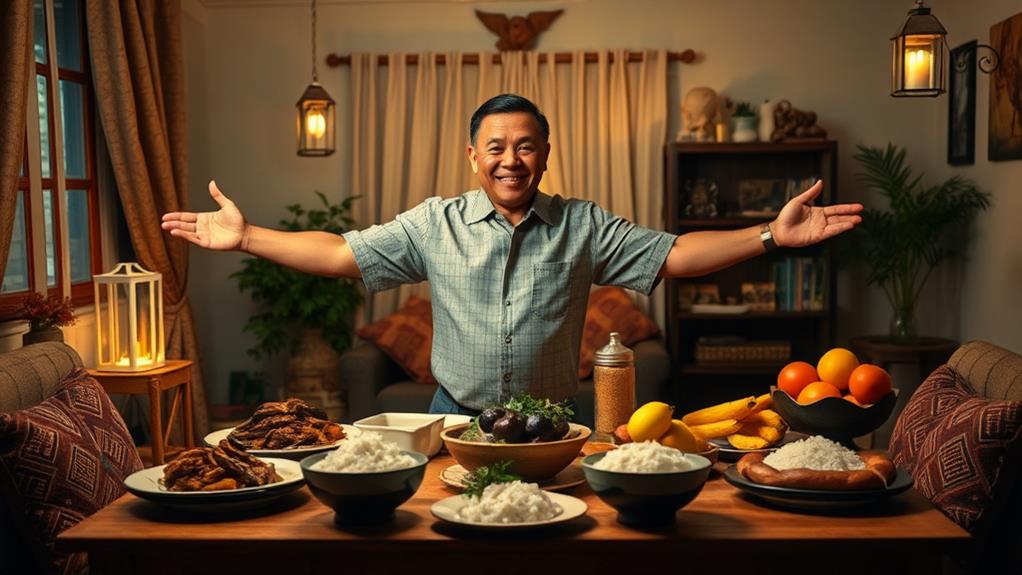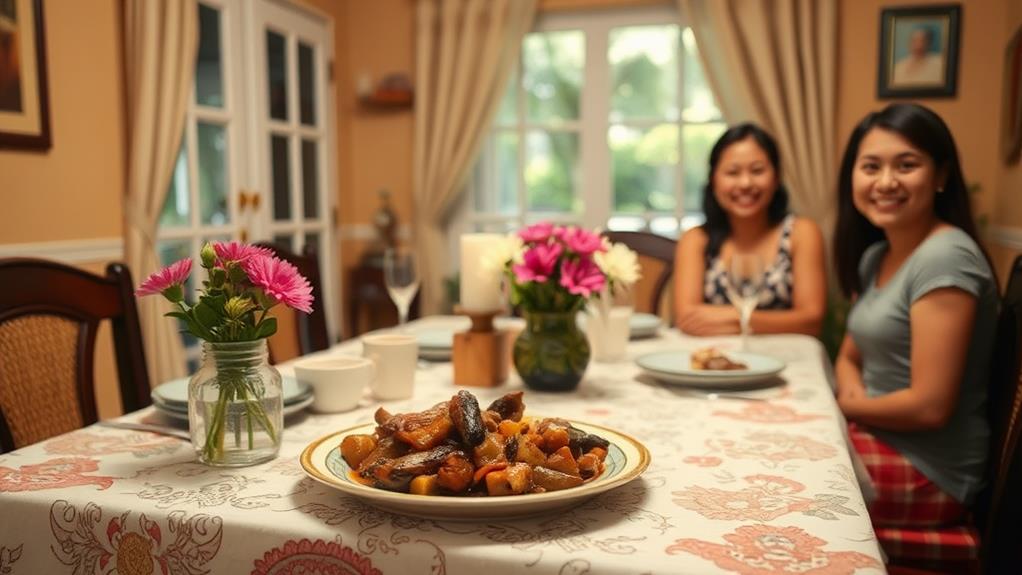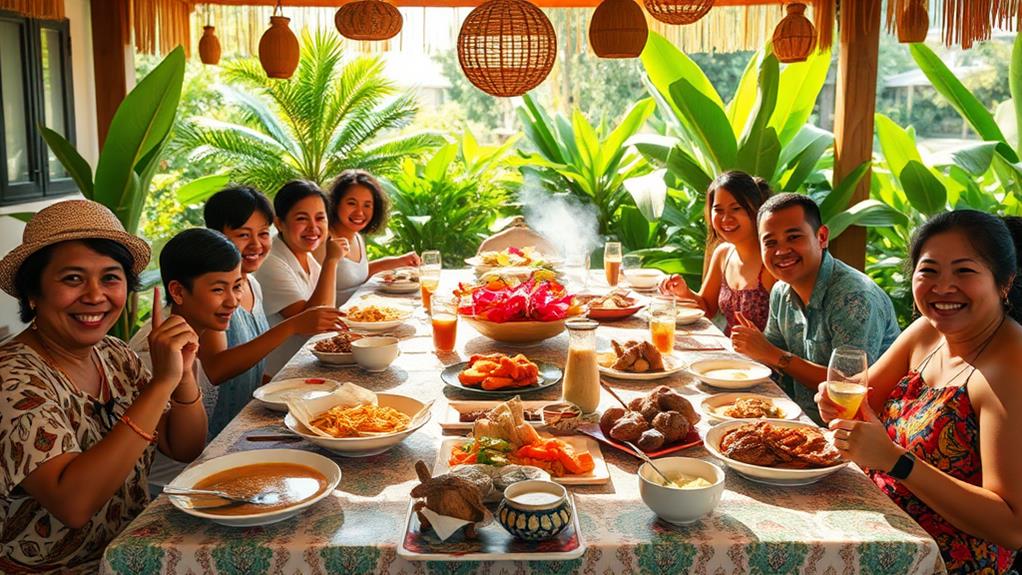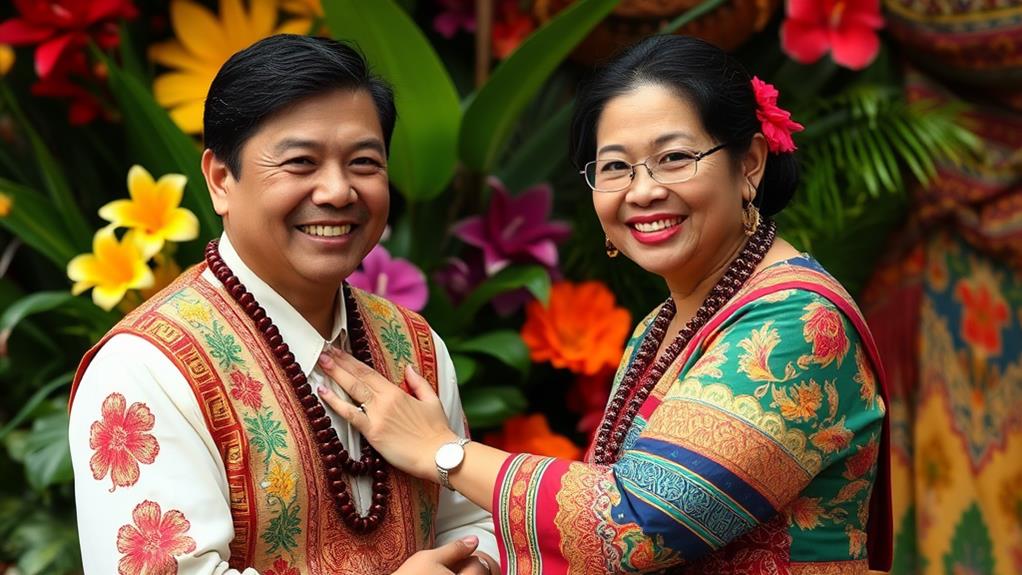Filipino Culture is Built on Hospitality
In the Philippines, hospitality is a fundamental aspect of the culture, where strangers are welcomed as friends and guests are treated like family. This warm and inclusive atmosphere is rooted in the value of magiliw na pagtanggap, which translates to treating guests with kindness and generosity.
When you visit a Filipino home, you can expect to be offered food and drinks, and your comfort is prioritized to make you feel valued and appreciated. This cultural hallmark is deeply ingrained in everyday life, reflecting the rich history and significance of Filipino hospitality.
In Filipino culture, hospitality is not just a gesture, but a way of life. It's evident in the way people interact with each other, prioritizing relationships and building strong bonds.
As you explore this beautiful culture further, you'll discover the many ways hospitality is woven into the fabric of Filipino society.
Defining Filipino Hospitality

Filipino hospitality, or magiliw na pagtanggap, is a cultural value that embodies warmth, care, and respect towards guests. This attitude treats visitors like family, making them feel valued and prioritized.
When entering a Filipino home, guests are immediately offered food and drinks, accompanied by the inviting phrase "Kain na", which means "Let's eat." This gesture demonstrates the importance of nourishment and togetherness in Filipino culture.
Filipino hosts prioritize their guests' comfort by providing them with cozy accommodations, making them feel at home, just like the phrase "Dito ka na muna" suggests, which means "Stay here for a while." This emphasis on comfort and relaxation creates a sense of belonging, making guests feel seen and heard.
Filipino hospitality is more than just a gesture; it's a deep-seated cultural value that permeates everyday life. It's evident in the way strangers become instant friends, and guests are treated with genuine care and respect.
This value is woven into the fabric of Filipino culture, making visitors feel valued and appreciated.
Historical Roots of Hospitality
The Filipino tradition of hospitality has its roots in indigenous customs that predate colonial rule. These ancient practices emphasized sharing resources and celebrating the arrival of guests as a vital part of community life.
The Spanish colonization of the Philippines introduced new customs and technologies that shaped local hospitality practices. For example, early interactions between Filipinos and foreign settlers, such as Malays, involved a culture of hospitality that celebrated sharing resources.
This cultural exchange lasted for three centuries and had a lasting impact on Filipino identity.
The influence of American and Japanese occupations added diverse cultural elements to Filipino hospitality. Despite historical challenges, such as economic degradation during colonial rule, the Filipino spirit of hospitality persisted.
Filipinos maintained core values of generosity and warmth, blending them with modern practices to create a unique cultural identity.
Cultural Significance of Hospitality

Filipino Hospitality: A Reflection of Cultural Values
When you enter a Filipino home, you're immediately enveloped in a sense of belonging, thanks to the warm welcome and aroma of freshly cooked meals. This is more than just a gesture – it's a reflection of the Filipino value of magiliw na pagtanggap, which emphasizes treating guests as family.
Fostering Social Connection and Harmony
Filipino hospitality creates an atmosphere that's both inviting and inclusive, fostering social connection and harmony. This is evident in the way Filipinos engage with their guests, making them feel valued and respected.
Economic Significance
The significance of hospitality in Filipino culture extends beyond the home, playing a crucial role in the country's tourism industry, which employed over 1.3 million people in 2022.
This highlights the importance of hospitality in promoting economic growth and development.
Global Recognition and Cultural Exchange
The global recognition of Filipino hospitality enhances the country's image as a welcoming destination, attracting international visitors and promoting cultural exchange through authentic interactions.
This exchange allows people from different cultures to learn from each other and appreciate their differences.
A Way of Life
Filipino hospitality is more than just a trait – it's a way of life that embodies warmth, generosity, and a deep appreciation for connection.
It's a reflection of the Filipino values of respect, kindness, and generosity, which are deeply ingrained in the culture.
Generosity Across Social Classes
Filipino families from all social classes prioritize generosity and hospitality. Regardless of their wealth or poverty, they'll open their hearts and homes to guests. In humble bamboo huts, acts of kindness and generosity are a way of life, where sharing food and resources is commonplace.
This spirit of generosity is expressed through the offering of meals to guests, showcasing a commitment to their comfort and satisfaction, even in times of scarcity. For example, a family may offer a guest a meal, even if it means they've to sacrifice their own food.
This tradition of hospitality knows no socioeconomic bounds, as families from various backgrounds warmly welcome both locals and foreigners alike into their homes.
This generosity reinforces the importance of strong family ties and community bonds, creating a supportive environment that serves as a source of strength during challenging times. By sharing resources and offering support, Filipino families demonstrate the value they place on unity and cooperation.
Legacy of Filipino Hospitality

Filipino Hospitality: A Timeless Legacy
Filipino hospitality is a cultural treasure that has been passed down through generations, rooted in the value of magiliw na pagtanggap, or warm welcome. This genuine warmth promotes a sense of family ties, making guests feel like part of the family.
Prioritizing Kindness and Generosity
In the Philippines, treating guests with kindness and generosity is a top priority, regardless of socioeconomic status. This value is deeply rooted in cultural practices, where hosts go out of their way to provide comfort and care to their visitors.
For example, offering a warm meal or refreshing drink is a common gesture of hospitality.
Historical Influences and Cultural Expressions
Historical influences, such as Spanish and American colonization, have shaped the evolution of hospitality practices in the Philippines. This blend of cultural expressions is unique and recognizable.
For instance, the traditional Filipino greeting, "Selamat datang!" (Welcome!), reflects the country's Malay and Spanish heritage.
National Pride and Tourism
Filipino hospitality is globally recognized as a source of national pride, significantly contributing to the tourism industry and enhancing the country's image as a welcoming destination.
The Bayanihan spirit, which embodies acts of kindness and generosity, showcases the community-oriented mindset that persists even in times of scarcity. This spirit reinforces social bonds and connections, making visitors feel at home.
Expressions of Hospitality Today
Filipino Hospitality: A Vibrant Tradition
Filipino hospitality, or magiliw na pagtanggap, is a living tradition that continues to thrive today. It's about making guests feel valued and cared for.
Warm Greetings
When you experience Filipino hospitality, you'll be warmly greeted with phrases like "Kumusta po kayo?" (How are you?) and "Tuloy po kayo" (Come on in).
Delicious Food and Drink
You'll be treated to a variety of delicious dishes and refreshing drinks, such as Lumpia and Adobo.
You'll often hear "Kain na" (Let's eat) and "Kumain ka na" (Eat already).
Invitations to Stay and Share
Filipinos will invite you to stay and share a meal together, saying "Dito ka na muna" (Stay here for a while) and "Tara, kain tayo" (Let's eat together).
Acts of Kindness and Generosity
Filipino hospitality goes beyond words, extending to acts of kindness and generosity that transcend socioeconomic barriers.
Even in communities with limited resources, the spirit of sharing and caring for guests is very much alive.
This cultural trait has created meaningful connections and lasting memories for countless visitors.
Culinary Traditions in Hospitality

Filipino Hospitality and Culinary Traditions
When you enter a Filipino home, the inviting aroma of sizzling food and freshly brewed coffee immediately makes you feel welcome. Food plays a vital role in Filipino culture, reflecting the strong family-oriented values of the Philippines. As a guest, you're offered a variety of dishes, such as crispy lumpia, savory adobo, and sweet treats like halo-halo, showcasing the Filipino people's culinary traditions.
Sharing a meal is an integral part of Filipino culture, fostering connections and creating memories. The phrase "Kain na" or "Let's eat" signals the start of a shared dining experience, where relationships are built and warmth is exchanged.
By sharing a meal, you're not just satisfying your hunger, you're experiencing the warmth of Filipino hospitality. Your hosts will often ask about your favorite meals, ensuring you feel satisfied and cared for.
In Filipino culture, welcoming guests is an integral part of daily life, and culinary traditions are at the heart of it. As you sit down to enjoy a delicious home-cooked meal, you'll realize that food is more than just sustenance – it's a way to connect with others and experience the richness of Filipino culture.
Comfort and Care for Guests
Family-Oriented Hospitality
Three generations of family members work together to ensure a remarkable stay. As a guest, you can expect exceptional comfort and care, with every detail meticulously attended to.
Fresh towels, toiletries, and home-cooked meals demonstrate the thoughtful touches that make you feel at home.
Filipino Hospitality Values
Filipino hospitality is centered on making you feel valued and respected. Your hosts will treat you like family, offering traditional favorites like lumpia and adobo, and ensuring you have everything you need.
They regularly check in on you, asking if you need anything, and genuinely care about your response.
This kind of hospitality creates a welcoming atmosphere, making you feel grateful and at ease even after your visit is over.
Warm Greetings and Friendly Nature

Warmth and Hospitality Define Filipino Culture
Filipino culture is built on a foundation of warmth and genuine interest in others' well-being.
When you enter a Filipino home, you're immediately greeted with warm gestures and friendly expressions that set the tone for a welcoming stay. These greetings are more than just formalities; they're genuine expressions of interest in your well-being.
Filipinos ask questions like "Kumusta po kayo?" (How are you?) or invite you to "Tuloy po kayo" (Please come in) to create a sense of connection and belonging.
These gestures make you feel valued and appreciated from the start. They go above and beyond to ensure you feel comfortable and at ease, inviting you to "Dito ka na muna" (Stay here for a while) and making you feel like part of the family.
The friendly nature of Filipinos is infectious, making you feel at home in their company. Their hospitality ethos is centered around making you feel like you belong, which is what makes Filipino culture so endearing.
Hospitality in Filipino culture is deeply rooted in the traditional social structure foundation of the barangay. The concept of “pakikisama” or communal unity is integral, where members prioritize the welfare of the community over individual needs. This reflects the core values of bayanihan and mutual cooperation within the barangay’s social structure foundation.
Lasting Impressions and Future of Hospitality
Filipino Hospitality: A Lasting Legacy
The Philippines has established itself as a premier travel destination, thanks to the country's warm and gracious hospitality. This unique trait has created lasting friendships and a positive national image. The Filipino spirit, rooted in compassion for others, makes visitors feel welcome and valued.
As the tourism industry continues to evolve, the future of Filipino hospitality will seamlessly blend traditional warmth with modern amenities. This fusion will ensure that the spirit of generosity remains at its core, upholding cultural pride and catering to the evolving expectations of visitors.
For instance, hotels and resorts are incorporating local materials and designs into their infrastructure, while also providing state-of-the-art facilities and services.
Maintaining an exceptional reputation for hospitality is crucial, as it supports the economy and job creation in the sector. By preserving and promoting this hallmark of Filipino culture, we contribute to a legacy that will leave a lasting impression on generations to come.
As tourism drives cultural exchange, it's essential to uphold the global perception of Filipino hospitality as exceptional.
Frequently Asked Questions
Why Is Hospitality Important in Filipino Culture?
Hospitality is a fundamental value in Filipino culture because it represents respect, kindness, and generosity. This value is deeply rooted in the country's history and social norms. For Filipinos, hospitality isn't just about being friendly; it's about building strong community bonds and upholding family values.
Filipinos believe that hospitality helps create a sense of belonging. When they open their hearts and homes to guests, they foster lasting connections and memories that transcend borders.
For example, in Filipino culture, it's common for families to host feasts and celebrations that bring together extended family and friends, strengthening social ties and preserving cultural traditions.
By practicing hospitality, Filipinos demonstrate their respect for others. They believe that welcoming guests into their homes is a sign of respect and kindness.
In return, guests are expected to show appreciation and gratitude for the hospitality they receive. This reciprocal respect is essential in Filipino culture, as it helps maintain social harmony and builds trust among community members.
What Is the Hallmark of Being a Filipino?
Filipino Culture is Built on Warmth and Generosity
Being a Filipino is characterized by a strong sense of community and warmth. This is evident in the way Filipinos welcome one another at family gatherings and cultural celebrations.
For example, the traditional "bayanihan", where neighbors help each other move to a new home, showcases the importance of collective effort and mutual support.
Traditional Values are at the Heart of Filipino Identity
Filipino culture places a high value on traditional values such as respect for elders, strong family ties, and generosity.
These values are demonstrated in everyday life, such as when children are taught to address their elders with respect and deference, using titles such as "Tita" or "Tito".
Additionally, the concept of "utang na loob", or debt of gratitude, emphasizes the importance of repaying kindness and generosity.
A Sense of Belonging Defines the Filipino Experience
At its core, being a Filipino is about feeling a sense of belonging to a community that looks out for one another.
This sense of community support is evident in the way Filipinos come together to celebrate milestones, such as fiestas and weddings, and in times of need, such as during natural disasters.
Where Do the Origin of Hospitality in the Philippines Starts?
The origins of hospitality in the Philippines date back to pre-colonial times. In this era, indigenous practices welcomed foreign settlers with open arms and communal feasts. For instance, the Ifugao people of the Cordillera Mountains would host ceremonies called "cañaos" to celebrate special occasions, which included sharing food and drinks with guests.
These traditional practices were rooted in cultural influences and historical roots. They varied across regions, but shared a common thread of warmth and generosity. For example, in the Visayas region, the concept of "barangay" emphasized community and cooperation, which extended to welcoming outsiders.
Over time, these customs blended with new cultural influences. The arrival of Spanish colonizers introduced Western-style hospitality, which merged with existing practices. This blending of cultures shaped the unique hospitality seen in the Philippines today.
Are Filipinos Kind and Hospitable?
Filipinos are known for their kindness and hospitality. This is rooted in their cultural traditions that emphasize community bonding and generosity. For instance, when you're a guest in a Filipino home, you're often offered food and drinks, making you feel welcome and cared for.
They treat you like family, providing a listening ear and genuine interest in your well-being.
Filipino kindness is contagious, inspiring you to reciprocate with equal warmth. This is because their hospitality isn't just about providing material comforts, but also about making you feel valued and respected as a person.
Filipinos are known for their warm smiles and genuine gestures, which make you feel at ease and appreciated.